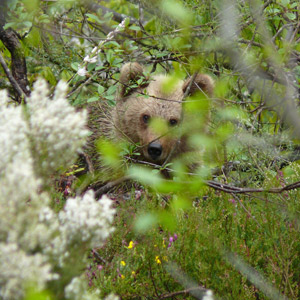CONTRIBUTION
The bear appears as a priority species in the EU Habitats Directive, thereby establishing it as in need of strict protection. By the early 1990s, its population had reached a critical juncture, under the dual pressure of poaching and poor reproduction rates. In 1992, only five female bears bore young in the whole Cantabrian Mountain region.
It was in this setting that Fundación Oso Pardo came into being along with the Bear Patrol project, a first-of-its-kind initiative in Spain implemented in the four administrative regions with bear populations along the Cantabrian range: Galicia, Castilla y León, the Principality of Asturias and Cantabria. The Bear Patrols, which operated up to 2011, contributed decisively to the species’ recovery and were the principal motive for the BBVA Foundation award.
Drawing their members from local inhabitants trained and equipped specifically for the job, the Patrols work consciously to create a social climate supportive of their efforts. They have accordingly sought to protect the bears’ habitat and combat poachers, while at the same time promoting rural development by projecting a positive image of the species.
Among the project’s success stories is the signing of agreements with hunting federations and clubs in southwest Asturias representing more than four thousand local hunters. Also, Bear Patrols have collaborated in scientific studies on the brown bear and its conservation.
In the last twenty years, the Patrols have distributed some 1,500 electric fence energizers to protect crops and beehives, and have given talks to almost 55,000 schoolchildren and university students. Fundación Oso Pardo can also point to a strong track record against poaching: 151 offenders detected and reported and 1,519 traps – wire snares – located and dismantled by the Bear Patrols.
Much of this work is done in partnership with institutions and government authorities. The Bear Patrols, for instance, take an active part in the annual census of female bears with cubs, gathering vital data on demographic trends in the bear population; supply provisioning and guidance services to the environmental police force Seprona in its fight against poaching and forest fires; and participate in a variety of activities organized by local councils in bear-inhabited areas. Since 1994, they have also had framework agreements in place with the four regional governments with territory in the Cantabrian Mountains.
MORE
Fundación Oso Pardo
